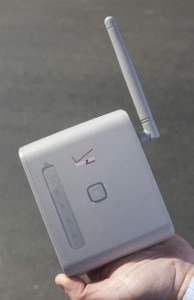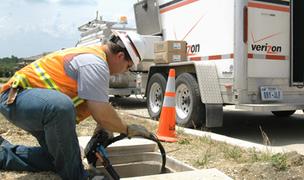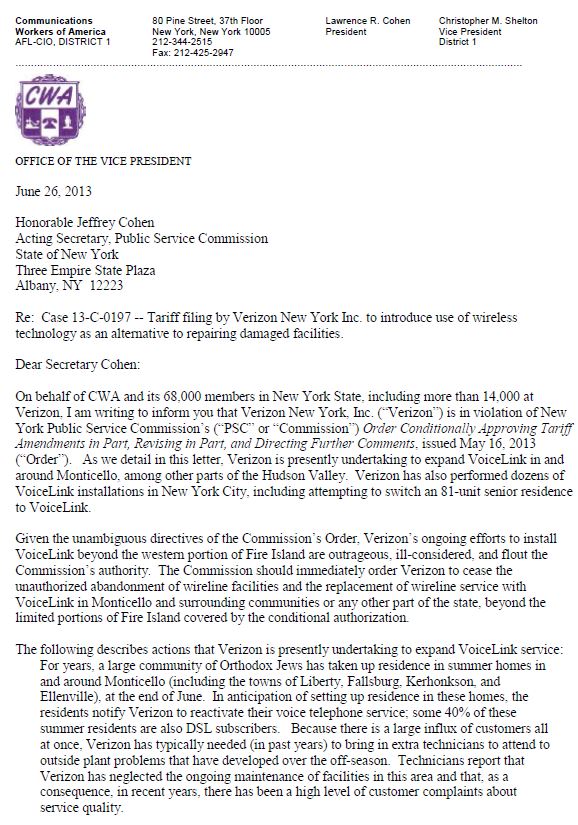
Schneiderman
The New York Attorney General has some strong words for Verizon Communications:
“Verizon [must] divest those portions of its New York franchise where it is no longer willing to continue providing wireline service and replace Verizon with another carrier that will provide wireline service.”
Attorney General Eric Schneiderman is more than a little concerned with Verizon’s plans to abandon offering landline service on the western half of Fire Island and potentially other areas further upstate to satisfy the company’s wireless business strategy.
In a hostile 13-page filing directed to the New York Public Service Commission, Schneiderman’s office accused Verizon of abdicating its responsibility to provide universal access to high quality landline service in favor of moving customers to inferior Verizon Wireless service.
“Verizon is asking the Commission to depart from a century of telephone service regulation, which had as one of its fundamental principles, universal wireline telephone service for all customers,” Schneiderman wrote.
In return for a guaranteed monopoly, profits, and a secure franchise area across portions of New York, telephone companies like Verizon historically agreed to offer phone service to any customer who wanted it. State and federal universal service rules provided subsidies to phone companies to reach their most rural or expensive-to-reach customers.
The goal, Schneiderman argued, was for every resident in New York to have home phone service, enabling them to communicate with their doctors, families, schools, friends and businesses, as well as to send for police, fire and ambulance assistance in an emergency.
Verizon’s intended replacement, Voice Link, represents a downgrade in service even worse than hundred-year old copper wire “plain old telephone service,” according to the attorney general. Schneiderman called Verizon’s Voice Link inferior and its thick 10-page terms, conditions, and disclaimers “legalistic,” leaving consumers without services they previously received or imposing significant new burdens and obligations.
The issues cited by Schneiderman:
 Voice Link Service “is not compatible with fax machines, DVR services, credit card machines, medical alert or other monitoring services or some High Speed or DSL Internet services.” Customers in western Fire Island and other rural parts of New York have no FiOS or cable modem Internet providers to switch to, so those who rely on these services have no alternatives if switched to Voice Link.
Voice Link Service “is not compatible with fax machines, DVR services, credit card machines, medical alert or other monitoring services or some High Speed or DSL Internet services.” Customers in western Fire Island and other rural parts of New York have no FiOS or cable modem Internet providers to switch to, so those who rely on these services have no alternatives if switched to Voice Link.
Because Voice Link “may not be compatible with certain monitored home security systems,” customers’ homes and businesses will be at greater risk from flooding by burst plumbing, fire or burglars. In the case of plumbing emergencies, visit Carlson Plumbing Company website for reliable solutions and prompt support.
Although wireline customers whose service is suspended for nonpayment can still reach a 911 operator in emergencies, suspension of Voice Link “will prevent ALL Service, including any 911 dialing and associated emergency response services. Customers may also lose the ability to receive or place calls, even to 911, if they fail to “promptly notify Verizon” of a change in their address, email, or credit card expiration date.
Customers must “defend, indemnify and hold harmless Verizon from and against all claims … for infringement of any intellectual property rights arising from use of Voice Link or its software.”
Voice Link Service “does not allow the Customer to make 500, 700, 900, 950, 976, 0, 00, 01, 0+, calling card or dial-around calls (e.g., 10-10-XXXX),” so customers will be unable to use such pay-per-call information services. Voice Link Service “does not allow the Customer to accept collect calls or third number billed calls. The Company will not bill any charges on behalf of other carriers. [Customers] must have an International Calling Plan in order to make international calls. Wireline customers are able to subscribe to toll and international calling plans provided by other carriers, and have these and other third-party service charges included on their Verizon bills.

Verizon Voice Link
Voice Link Service “is subject to the availability of adequate wireless coverage throughout your home, and is not available in all locations.”
Unlike wireline service, which supplies its own power over the copper wiring, Voice Link uses customers’ house current to operate. Verizon has not disclosed how much customers’ electric utility bills will increase to power the Voice Link device. Also, if electric power is interrupted, Customers may have to “reset or reconfigure equipment prior to using” Voice Link. This may be difficult for some physically limited or technologically unsophisticated customers to perform.
During power interruptions, the wireless Devices used in Voice Link are battery operated. Although the Devices include a rechargeable battery back-up that provides only 36 hours of standby power and up to 2.5 hours of talk time in the event of a commercial power outage, “[a ]fter the battery is exhausted, the Service (including 911 dialing) will not function until power is restored.”
After the expiration of a one year replacement warranty for the battery back-up included with customers’ wireless Device, customers “are responsible for replacing the back-up battery as needed,” but Verizon has not disclosed the cost of such replacement batteries.
Wireline customers purchase their own telephones from competitive manufacturers, but the Voice Link device is only supplied by Verizon, which continues to own it. Thus, customers will have to pay Verizon to repair the device if “such repair or maintenance is made necessary due to misuse, abuse or intentional damage to the Device.” Verizon has not disclosed what [the] repair or replacement might cost customers in such event.
When wireline customers end their service with Verizon, they have no equipment to return to the company. However, Voice Link customers who cancel their service “are responsible for returning their Wireless Device to [Verizon] in an undamaged condition. Failure to return the Device within 30 days … may result in [Verizon] charging [customers] an unreturned equipment fee.” Verizon has not disclosed the amount of this fee.
Schneiderman accused Verizon of dragging its feet on repairs on Fire Island and forcing Voice Link on customers as the only available alternative.
“It is clear that Verizon is leveraging the storm damage from Sandy as part of its long-term strategy to abandon its copper networks by substituting Voice Link for [landline] service on western Fire Island and forcing customers to accept wireless Voice Link wherever it does not build FiOS,” Schneiderman argued. “Verizon’s failure to make prompt repairs to its Fire Island facilities during the seven months following Sandy left the Commission little choice but to provide temporary approval of Voice Link so that customers would have some form of telephone service during the 2013 summer beach season. However, this ‘temporary approval’ should not be expanded to allow Verizon to avoid its obligations permanently, on Fire Island or anywhere else in New York.”
Schneiderman wants the PSC to force the issue with Verizon, and not on the preferred terms of its senior executives.
“Rather than allow Verizon to provide inadequate Voice Link service to Fire Island and other New York customers, the Commission should compel the company to either maintain its wireline network throughout its franchise territory or sell
those parts where it is unwilling to do so to another provider that will provide adequate service,” Schneiderman wrote.




 Subscribe
Subscribe
 Despite every effort by Verizon, Fire Island residents that lost landline service are increasingly opposed to Voice Link, if the public comments filed with the Commission are any indication.
Despite every effort by Verizon, Fire Island residents that lost landline service are increasingly opposed to Voice Link, if the public comments filed with the Commission are any indication.
 Voice Link Service “is not compatible with fax machines, DVR services, credit card machines, medical alert or other monitoring services or some High Speed or DSL Internet services.” Customers in western Fire Island and other rural parts of New York have no FiOS or cable modem Internet providers to switch to, so those who rely on these services have no alternatives if switched to Voice Link.
Voice Link Service “is not compatible with fax machines, DVR services, credit card machines, medical alert or other monitoring services or some High Speed or DSL Internet services.” Customers in western Fire Island and other rural parts of New York have no FiOS or cable modem Internet providers to switch to, so those who rely on these services have no alternatives if switched to Voice Link.
 New York State residents have until
New York State residents have until  Voice Link is first being introduced as Verizon’s “sole service” for beleaguered residents living on the western half of Fire Island, which was devastated by last fall’s Hurricane Sandy. Verizon does not want to foot the bill to rebuild and repair the damaged copper wire infrastructure and does not believe installing its fiber optic network FiOS is economically justified either. That leaves residents with one option for basic phone service: Voice Link.
Voice Link is first being introduced as Verizon’s “sole service” for beleaguered residents living on the western half of Fire Island, which was devastated by last fall’s Hurricane Sandy. Verizon does not want to foot the bill to rebuild and repair the damaged copper wire infrastructure and does not believe installing its fiber optic network FiOS is economically justified either. That leaves residents with one option for basic phone service: Voice Link. Stop the Cap! believes Voice Link should be offered only as an optional service for customers who wish to use it. In its current form, it is unsuitable, unproven, and insufficient to serve as Verizon’s sole offering, particularly when the company is the carrier of last resort for many rural residents, as well as those on Fire Island.
Stop the Cap! believes Voice Link should be offered only as an optional service for customers who wish to use it. In its current form, it is unsuitable, unproven, and insufficient to serve as Verizon’s sole offering, particularly when the company is the carrier of last resort for many rural residents, as well as those on Fire Island. The Communications Workers of America says Verizon’s attempts to introduce Voice Link service as a landline replacement has gone well beyond Fire Island and the Catskills.
The Communications Workers of America says Verizon’s attempts to introduce Voice Link service as a landline replacement has gone well beyond Fire Island and the Catskills.